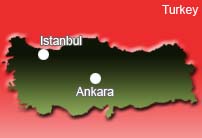Arabs react with hope and anxiety to Obama inauguration
 Istanbul - In the first few hours following the inauguration of Barack Obama as US president, a change of direction has become perceptible in the three areas most sensitive to the Arab world: The presence of US troops in Iraq; the Arab-Israeli conflict; and the abuse of human rights suspected at the Guantanamo Bay prison camp.
Istanbul - In the first few hours following the inauguration of Barack Obama as US president, a change of direction has become perceptible in the three areas most sensitive to the Arab world: The presence of US troops in Iraq; the Arab-Israeli conflict; and the abuse of human rights suspected at the Guantanamo Bay prison camp.
On Wednesday, Obama ordered the suspension of prosecutions at the US prison camp at Guantanamo for 120 days to allow Obama's administration to review the legal processes at the prison camp and the cases pending there.
But despite the play that Obama's inauguration received throughout the Arab world on Tuesday, the region was less enthused over the extraordinary nature of the new man in the White House than by the departure of his predecessor - George W Bush.
"Finally, Bush has left the White House ... he leaves behind a bloody legacy," wrote the Lebanese newspaper al-Safir.
The state-run Syrian news agency SANA on Wednesday published a flattering photo of Obama, gazing masterfully into the middle distance - beside a shot of the hapless Bush ducking the shoe thrown by the Iraqi journalist Montazer al-Zaidi.
"Obama enters the White House through the largest door, while Bush leaves through the smallest," sneered the agency.
The Palestinians, who suspected Bush's promises of a Palestinian state to be little more than empty words, are mostly of the opinion that things can now only get better.
However, Khaled Abdul-Majid, a spokesman for militant Palestinian groups based in Damascus, pointed out the failure of Obama to refer to the Arab-Israeli conflict.
"Obama did not mention a single syllable about the Palestinians in his inauguration speech," he said.
In Iraq, where the US still has more than 140,000 troops stationed, Obama's call for a "responsible" withdrawal from the country was well received.
"We are pleased that he made it clear in his speech that he is going to fulfill his election campaign promise," said Abbas al- Bajati, a member of the governing Shiite alliance and of the Iraqi parliament's security committee.
"Obama has shown that he is not as attached as his predecessor to parties or individuals, but to institutions," said Iyad al-Samarri, an Iraqi Sunni politician.
Obama's remark that Iraq's affairs should be best administered by Iraq has been especially well received by many Iraqi politicians, to the point that to not praise Obama for it is taken as a sign of a lack of patriotism.
But there exists the opposite current, which fears Iraqi self governance because of the perceived corruption of the current ruling class, as well as of a resurgence of violence in the absence of American troops.
So although the Status of Forces Agreement, which mandates a US departure from Iraq by 2011, was wrapped up before the departure of Bush under the insistence of Prime Minister Nuri al-Maliki, there exists an emergency plan to deal with an earlier-than-expected withdrawal forced by Obama, according to the semi-state newspaper al- Sabah. (dpa)